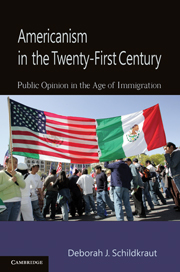Book contents
- Frontmatter
- Contents
- Figures and Tables
- Acknowledgments
- 1 Introduction: American Identity in the Twenty-First Century
- 2 The Twenty-First-Century Americanism Survey
- 3 Defining American Identity in the Twenty-First Century
- 4 Policy Implications of Multidimensional Americanism
- 5 The Myths and Realities of Identity Prioritization
- 6 Does “Becoming American” Create a “Better” American?
- 7 Immigrant Resentment: When the Work Ethic Backfires
- 8 The Politics of American Identity
- Appendix A 21-CAS Survey Questions
- Appendix B Supplementary Tables from Chapter 3
- Appendix C Supplementary Tables from Chapter 5
- Appendix D Supplementary Tables from Chapter 6
- Appendix E Supplementary Tables from Chapter 7
- References
- Index
7 - Immigrant Resentment: When the Work Ethic Backfires
Published online by Cambridge University Press: 05 June 2012
- Frontmatter
- Contents
- Figures and Tables
- Acknowledgments
- 1 Introduction: American Identity in the Twenty-First Century
- 2 The Twenty-First-Century Americanism Survey
- 3 Defining American Identity in the Twenty-First Century
- 4 Policy Implications of Multidimensional Americanism
- 5 The Myths and Realities of Identity Prioritization
- 6 Does “Becoming American” Create a “Better” American?
- 7 Immigrant Resentment: When the Work Ethic Backfires
- 8 The Politics of American Identity
- Appendix A 21-CAS Survey Questions
- Appendix B Supplementary Tables from Chapter 3
- Appendix C Supplementary Tables from Chapter 5
- Appendix D Supplementary Tables from Chapter 6
- Appendix E Supplementary Tables from Chapter 7
- References
- Index
Summary
Even though many nonwhite Americans, immigrant and native born alike, define the normative content of American identity the same as whites do (Chapter 3), think of themselves as American (Chapter 5), and differ minimally from whites in their sense of obligation, patriotism, and trust – with differences diminishing across each immigrant generation (Chapter 6), media coverage of immigration issues suggests that many white native-born Americans think otherwise. One is left with the impression that native-born whites believe that today's immigrants and their descendants reject American norms, a belief that generates a kind of resentment that I call “immigrant resentment.” The purpose of this chapter is to examine such resentment.
The constitutive norms that define the meaning of one's national identity provide stereotypes that help people derive expectations about the behavior of their fellow citizens. Negative feelings toward particular subgroups in society often stem from perceptions that members of such groups violate particular national norms, and thus threaten the meaning of one's own identity. For instance, the perception that African Americans violate cherished liberal American norms such as individualism or the work ethic has been shown to be relatively widespread and enduring, and it has proved to be a potent force driving preferences on race-targeted policies such as affirmative action (Kinder and Sanders 1996). This particular perception of norm violation has multiple terms in the literature, including symbolic racism, modern racism, and racial resentment (Henry and Sears 2002). The view that blacks threaten a central element of the national value system holds up as a powerful predictor of attitudes even when more tangible threats are included in models of opinion formation.
- Type
- Chapter
- Information
- Americanism in the Twenty-First CenturyPublic Opinion in the Age of Immigration, pp. 160 - 194Publisher: Cambridge University PressPrint publication year: 2010



